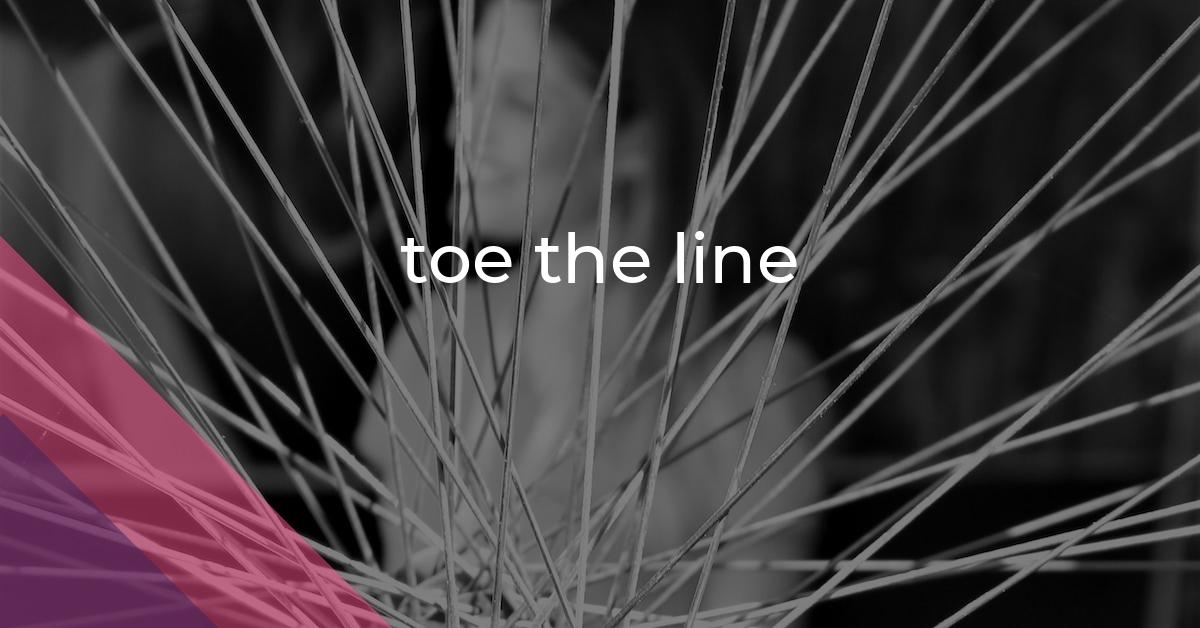toe the line: Idiom Meaning and Origin
What does ‘toe the line’ mean?
"Toe the line" means to conform to rules or follow a strict set of guidelines. It suggests complying with established expectations or norms, often under the scrutiny of authority. The phrase originated from sports, where athletes must keep their toes behind a specific line to avoid penalties or disqualification.

Idiom Explorer
The idiom "walk the line" means to maintain a careful and conscientious balance between two opposing forces or viewpoints, without deviating or favoring one over the other.
The idiom "to tell the truth" means being honest and sincere in one's statement or confession.
The idiom "top of the line" means something that is of the highest quality or the best in its category.
The idiom "tooth-and-nail" means to fight or compete fiercely and aggressively, using every means necessary to achieve victory or success.
The idiom "toes up" means to be dead or to be in a state of complete failure or cessation. It is often used informally to indicate that someone or something has come to an end or has stopped working or functioning.
The idiom "to a T" means exactly or perfectly, often used to describe something that is done or fits perfectly without any flaws or errors.
The idiom "tip the scales" means to have a decisive or significant influence on a situation or outcome, often by providing an advantage or causing a change in balance.
The idiom "tip the scale" means to have a decisive influence or to cause a significant change in a situation or outcome. It suggests the idea of adding weight to one side of a balance scale, disrupting the equilibrium.
The idiom "tip one's hat" means to show respect or admiration towards someone or something. It is a gesture that originated from men tipping their hats as a sign of courtesy or acknowledgement.
Understanding Tradition
The phrase "toe the line" is an idiom commonly used in the English language. It is believed to have originated from the sport of boxing. In boxing matches, a designated line or mark is used to indicate the boundary that a boxer must not cross. Stepping outside of this boundary would result in a penalty. Over time, the idiom has taken on a metaphorical meaning that goes beyond the boxing ring.
While the exact origin of the phrase is unclear, it was first recorded in print in the early 19th century. "Toe the line" is commonly used in both British and American English and has become a part of everyday language.
"Toe the line" means to conform, follow rules, or adhere to established guidelines. It emphasizes the need to stay within the boundaries defined by authority figures or societal norms. The idiom conveys the idea of strict adherence to rules without deviating or challenging them.
The phrase can also carry the connotation of being under scrutiny or surveillance. It implies that someone is being watched to ensure they adhere to the rules. Failure to comply may result in negative consequences.
Furthermore, "toe the line" is associated with maintaining discipline, order, and control. It suggests the importance of following established protocols in both professional and personal contexts. By toeing the line, individuals are expected to act in a socially acceptable manner and within the bounds of what is considered appropriate behavior.
The idiom "toe the line" is commonly used in politics, sports, education, and even interpersonal relationships. It serves as a reminder of the importance of conformity and compliance, emphasizing the need to abide by rules and norms that govern a particular setting.
The related idiom "fall in line" is often used interchangeably with "toe the line." It carries a similar meaning of conforming or following the rules. "Fall in line" emphasizes the idea of joining others in a unified manner, suggesting a collective adherence to established guidelines.Similarly, "walk the line" is another related idiom that is often used in conjunction with "toe the line." It conveys the notion of carefully navigating a path or maintaining a balance between two extremes. "Walking the line" implies the need to make informed decisions while avoiding any actions or behaviors that could be considered crossing a boundary.
" In addition, "cross the line" is a related idiom that contrasts with "toe the line." While "toe the line" emphasizes conformity and adherence to rules, "cross the line" suggests violating or exceeding established boundaries. This idiom underscores the idea of pushing limits or engaging in behavior that is considered unacceptable or inappropriate. Finally, "toes up" is a related idiom that can indicate a state of being deceased. While the connection to "toe the line" may seem tenuous, it is possible to interpret "toes up" as crossing the final boundary and no longer adhering to any rules or guidelines.Example usage
Examples of how the idiom "toe the line" can be used in a sentence:
- He is known for always toeing the line, following the rules dutifully.
- The politician was warned to toe the line and not deviate from the party's official position.
- As a team captain, it is important for her to make sure all the players toe the line and adhere to the coach's instructions.
More "Compliance" idioms
We missed the mark - nothing found.



